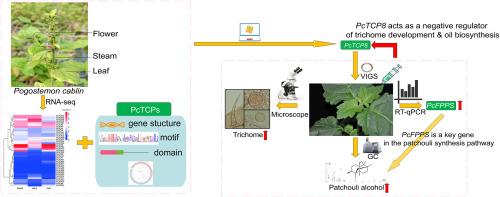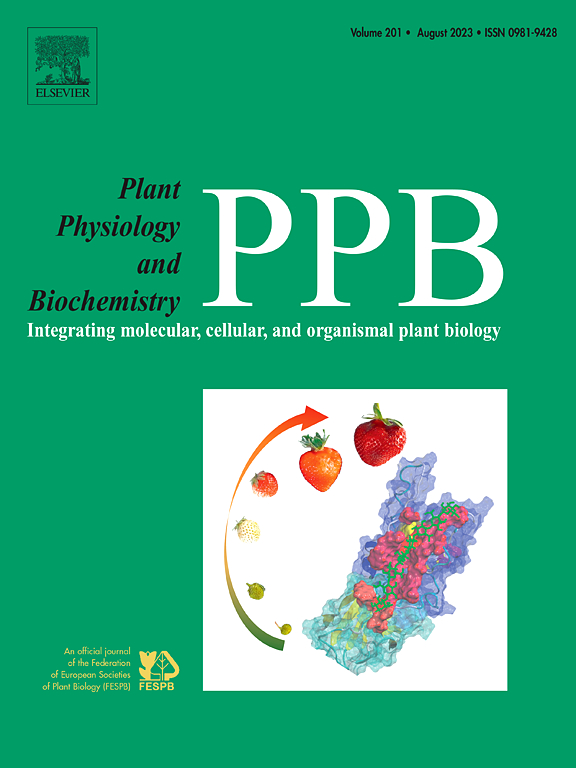广藿香毛状体发育相关基因TCP家族的全基因组鉴定及PcTCP8的功能分析。
IF 5.7
2区 生物学
Q1 PLANT SCIENCES
引用次数: 0
摘要
毛状体是植物次生代谢产物合成和储存的关键部位。TCP转录因子家族对毛状体细胞命运的决定至关重要。在广藿香中,毛密度显著影响萜类代谢物的积累,但TCP基因家族在这一过程中的作用尚不清楚。本研究对P. cablin中TCP蛋白进行了表征,并探讨了PcTCP8对毛状体发育和挥发性化合物生物合成的影响。它鉴定了44种PcTCP蛋白,并使用转录组数据进行表达谱分析,提供了功能见解。过表达PcTCP8降低了广藿香醇含量,病毒诱导的PcTCP8基因沉默(VIGS)导致毛密度增加,广藿香醇水平升高,PcFFPS表达上调。这些研究结果表明,PcTCP8在甘油三酯的腺体毛状体发育和精油生物合成中都起负调控作用。该研究为药用植物腺毛的遗传调控提供了新的见解,为该领域的进一步研究提供了有价值的信息。本文章由计算机程序翻译,如有差异,请以英文原文为准。

Genome-wide identification of TCP gene family and functional analysis of PcTCP8 gene related to trichome development in Pogostemon cablin
Trichomes are key sites for synthesis and storage of plant secondary metabolites. The TCP transcription factor family is essential for trichomes cell fate determination. In Pogostemon cablin, trichome density significantly affects the accumulation of terpenoid metabolites, but the role of TCP gene family in this process is unclear. This study characterized TCP proteins in P. cablin and explored the impact of PcTCP8 on trichome development and volatile compound biosynthesis. It identified 44 PcTCP proteins and used transcriptome data for expression profiling, providing functional insights. Over-expression of PcTCP8 decreased patchoulol content, virus-induced gene silencing (VIGS) of PcTCP8 resulted in increased trichome density, elevated patchoulol levels, and upregulated expression of PcFFPS. These findings demonstrate that PcTCP8 acts as a negative regulator of both glandular trichome development and essential oil biosynthesis in P. cablin. The study provides novel insights into the genetic regulation of glandular trichomes in medicinal plants, offering valuable information for future research in this field.
求助全文
通过发布文献求助,成功后即可免费获取论文全文。
去求助
来源期刊
CiteScore
11.10
自引率
3.10%
发文量
410
审稿时长
33 days
期刊介绍:
Plant Physiology and Biochemistry publishes original theoretical, experimental and technical contributions in the various fields of plant physiology (biochemistry, physiology, structure, genetics, plant-microbe interactions, etc.) at diverse levels of integration (molecular, subcellular, cellular, organ, whole plant, environmental). Opinions expressed in the journal are the sole responsibility of the authors and publication does not imply the editors'' agreement.
Manuscripts describing molecular-genetic and/or gene expression data that are not integrated with biochemical analysis and/or actual measurements of plant physiological processes are not suitable for PPB. Also "Omics" studies (transcriptomics, proteomics, metabolomics, etc.) reporting descriptive analysis without an element of functional validation assays, will not be considered. Similarly, applied agronomic or phytochemical studies that generate no new, fundamental insights in plant physiological and/or biochemical processes are not suitable for publication in PPB.
Plant Physiology and Biochemistry publishes several types of articles: Reviews, Papers and Short Papers. Articles for Reviews are either invited by the editor or proposed by the authors for the editor''s prior agreement. Reviews should not exceed 40 typewritten pages and Short Papers no more than approximately 8 typewritten pages. The fundamental character of Plant Physiology and Biochemistry remains that of a journal for original results.

 求助内容:
求助内容: 应助结果提醒方式:
应助结果提醒方式:


